Published on 31 July 2022
Edition 57: August 2022
-
Helpful contacts
Employee Assistance Program: 1800 099 444
Nurse & Midwife Support: 1800 667 877
Nurse & Midwife Health Program:
03 9415 7551 or 1800 888 236 -
Upcoming dates
August 2022:
1 World Breastfeeding Week commences
1 MACH Track applications close
4 National Aboriginal & Torres Strait Islander Children’s Day
8 Australian Clinical Entrepreneur Program applications close
10 New Footscray Hospital Prototype rooms open
12 Inspire Award nominations close
15 Deadline for mandatory Influenza vaccination for healthcare workers
25 Duty of Candor webinar – healthcare workers (12 noon) -
Nursing & Midwifery Executive
Adjunct Professor Shane Crowe
Executive Director of Nursing & Midwifery
Phone: 8345 1463
Email: shane.crowe@wh.org.auProfessor Bodil Rasmussen
Chair of Nursing, Deakin University/Western Health
Phone: 8395 8163
Email: bodil.rasmussen@wh.org.auDoug Mill
Director of Nursing & Midwifery
Division: Drug Health Services
Phone: 8345 1916
Email: douglas.mill@wh.orh.auHelen Sinnott
Director of Nursing & Midwifery, Sunshine
Divisions: Aged, Cancer & Continuing Care and Women’s & Children’s
Phone: 0435 962 716
Email: helen.sinnott@wh.org.auJo Mapes
Director of Nursing & Midwifery, Footscray
Division: Perioperative and Critical Care
Phone: 0423 302 337
Email: joanne.mapes@wh.org.auKate Renzenbrink
Director of Nursing & Midwifery Informatics (CNMIO)
Phone: 0425 772 324
Email: kate.renzenbrink@wh.org.auProfessor Linda Sweet
Chair of Midwifery, Deakin University/Western Health
Phone: 8395 1178
Email: linda.sweet@wh.org.auLisa Gatzonis
Director of Nursing & Midwifery Workforce
Phone: 9393 0127
Email: lisa.gatzonis@wh.org.auMonique Sammut
Director of Nursing & Midwifery, Sunbury
Divisions: COVID Response & WPHU, Clinical Support & Specialist Clinics
Phone: 0412 769 423
Email: monique.sammut@wh.org.auNicole Davies
Director of Nursing & Midwifery, Williamstown
Division: Emergency, Medicine & Access
Phone: 9732 8630
Email: nicole.davies@wh.org.auRohan Vaughan
Director of Nursing & Midwifery, Melton
Division: Chronic & Complex Care
Phone: 0434 365 769
Email: rohan.vaughan@wh.org.auAssociate Professor Tony McGillion
Director of Nursing & Midwifery (Inspiring Innovation)
Phone: 0466 925 108
Email: tony.mcgillion@wh.org.auWendy Giddings
Director of Nursing & Midwifery, Bacchus Marsh
Division: Bacchus Marsh & Melton
Phone: 0478 771 781
Email: wendy.giddings@djhs.org.au
From Shane
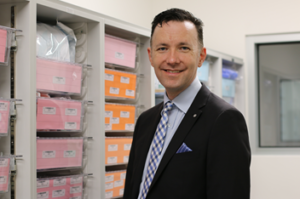
Winter is never easy in healthcare, and as the perfect storm of a growing Omicron outbreak and flu season continues to develop, our nurses and midwives continue to do their best despite being faced with extremely trying circumstances. Last week, nationwide COVID-related hospitalisations reached a new peak, while in Victoria we had 855 patients in hospital, including 35 in ICU. At Western Health we appear to have peaked at just under 90 COVID positive inpatients.
This wave has been tough, as we are all fatigued due to the cumulative effects of the past 2 and a half years – and there has been high levels of personal leave, COVID leave and high patient acuity and demand. We now have 4 COVID wards opened caring for COVID positive inpatients, and my sincere thanks to the staff on these wards for the remarkable job you do each day.
Pleasingly the high vaccination rates in the community has meant that not as many patients have needed ICU level care. Our workforce plans have continued to work well on the whole, despite the high levels of leave and COVID in the community. It appears that we have reached the peak of this wave, and are starting down the other side – hopefully this continues. Unfortunately, waves like this will likely continue into the future – so the Executive are meeting over the coming weeks to look at how we can try to flatten out these peaks.
A huge welcome to our 20 new graduate midwives that joined us in late July! I am sure that our maternity services will make you very welcome, and that you will have a very happy, supported and interesting start to your career.
It was also great to recently host the Premier and Minister for Health at Western Health as they announced new funding to support the ongoing employment of RUSONs within health services across Victoria. Western Health employs 361 RUSONs and 56 RUSOMs, and this funding is a very welcome investment in this important workforce to support our nurses and midwives.
This year our Nursing & Midwifery research teams are part of 5 Medical Research Future Fund (MRFF) applications, which is phenomenal! The MRFF are prestigious Category 1 research grants that are highly competitive and have a strong element of peer review. To have 5 applications going in from Western Health nurses and midwives shows just how evolved our research program has become.
For any of our nurses or midwives that have undertaken research over the past 2 years, the call for submissions to present at Research Week have just been released. For our budding and established researchers, applications are now open for Western Health’s nursing and midwifery research grants and the Mavis Mitchell scholarship – please read below for further details.
Finally, the challenges faced by us all over this winter has highlighted the importance of keeping your vaccination status up to date. 88% of our nurses and midwives have had their annual flu jab – for the remaining 12% there are only a couple of weeks now to get your mandatory Flu vaccine prior to 15 August. Additionally everyone aged over 30 years is now able to receive a fourth COVID vaccination dose. Western Health’s staff vaccination service is offering both vaccines to our staff, and you can alternatively go to your GP or local pharmacy. If you aren’t up to date, I’d strongly encourage you to act quickly – to protect yourself, your colleagues and family.
Shane Crowe
Executive Director, Nursing & Midwifery
Requesting additional shifts

Permanent staff that are available to work additional shifts above their current roster should enter the shifts they can work into HeWS. This will facilitate a centralised and electronic record that is easily accessible for the in- charge staff and Nursing & Midwifery Workforce Unit (NMWU) team when backfilling of unplanned vacant shifts is required.
How do I get access to do this?
You need to have access to the ‘availabilities application’ in HeWS. If you do not have access set up then go to wh.hews.com.au and complete the Request Access form using your Western Health information.
Activation of your access may take at least 24 hours – if this does not occur then please email NMWUHWSsupport@wh.org.au with your request.
Once I have access what do I need to do?
If you are not on a network computer (e.g. personal computer, mobile device) you will need to go to wh.hews.com.au and sign in.
If you are logged into a network computer, then go to the WH intranet page, click onto Quicklinks menu and click on Health-e Workforce Solutions
How do I record my availability to work?
If you have shift request access, click into the Availabilities Application. Otherwise it will open directly to your calendar screen when you login.
On the calendar screen, you can:
- Click on an individual shift/day to enter your availability to work.
- Drag across the screen if you have multiple shifts/days that you are available to work.
Once you are booked into a shift request in the system, you will see the area name and the colour will change to dark green (lighter green shifts reflect current rostered shifts in RosterOn).
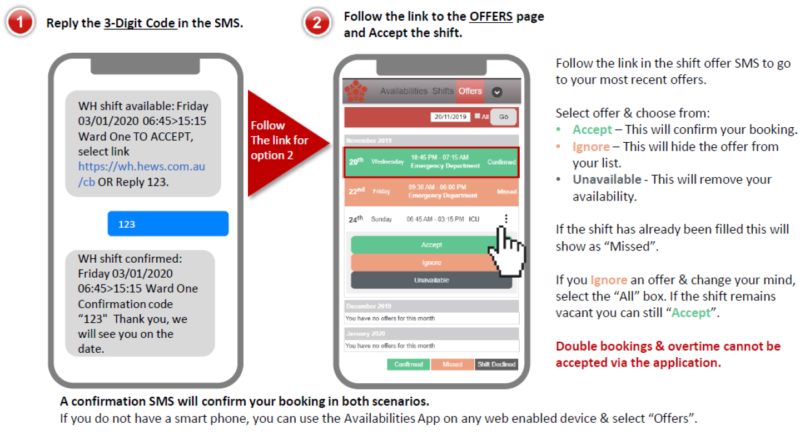
How am I notified about working a shift above my roster?
You will always be contacted as you must confirm that you agree to work the shift – this will occur either by phone or SMS. There are a few ways for this to occur:
- Your ‘In-charge’ staff member can see the availabilities of all staff for your area in the ‘availability screen’ in the workforce module – so
they may call you directly to see if you will work the shift - Once the shift request is generated in HeWS, the NMWU allocations team can view both the shift request and your availability to work.
They may either call you or send an SMS message to offer you the shift. To respond to the SMS, follow the instructions (see below) - Once you confirm that you will work, this is actioned in the system you will see your availability change to dark green and the name of the area in your calendar.
Will I be offered shifts in areas other than my department?
No you will not, unless a specific request has been made for you to be available to work in multiple areas. To protect against this happening, your profile is only set up to automatically be identified as available to work for your home cost centre – a manual change needs to be made for your profile to match to other cost centre shifts.
If you believe this has happened in error, please immediately contact NMWU Allocations office on 8345 6637 (between 0500 and 2100hrs) or the site AHA after hours.
My confirmed shifts in HeWS aren’t showing in RosterON?
Shifts confirmed on HeWS are entered manually into RosterOn on the same day as the shift is worked by the allocations team. If your shift is not in RosterOn by the end of your shift, please email nmwu@wh.org.au (Monday to Friday) or contact NMWU Allocations office on 8345 6637 (between 0500 and 2100hrs).
Staying COVID safe
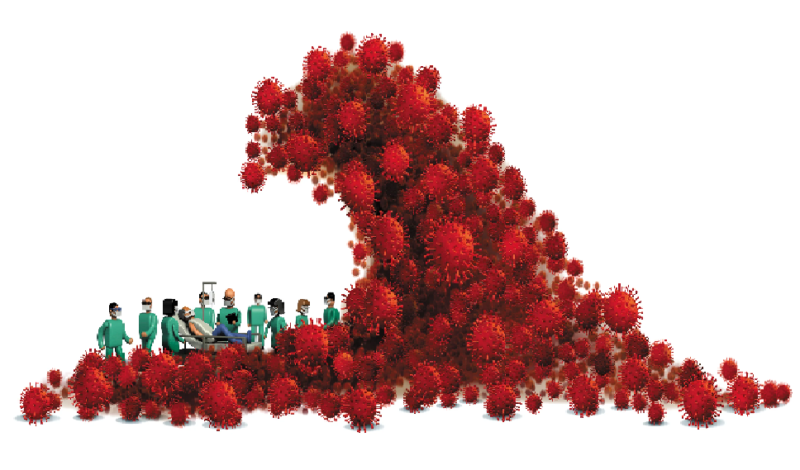
With the current COVID surge, let’s be sure that we are all continuing to be COVID safe in how we work, to protect ourselves, our colleagues and our patients.
Use of Nebulisers
A reminder that nebulisers are a high infectious risk aerosol generating device that should be avoided in order to protect staff and patients. Spacers are generally equally effective for most patients.
Keeping Safe at Work
We are continually reviewing our COVID safe guidelines in order to keep staff, visitors, volunteers, students and patients safe. Current recommendations are as follows:
- Meetings should be conducted via virtual means unless they are related to direct patient care (for example handover, case conference etc). Masks should be worn at all times and there should be no eating or drinking during face to face meetings.
- Mandatory training and other skills based training can continue to be conducted in person. Masks should be worn at all times and there should be no eating or drinking during sessions. Other education and training should be delivered online where feasible. Additionally, consideration could be given to delaying any significant training events.
With continued high rates of COVID in the community and consistent with the Department of Health advice, we encourage staff to discuss with their manager, the feasibility of working remotely where practical.
There is no change to cross campus travel guidance and staff are able to continue to cross campus as required.
Visitors
We are aware that visitor compliance with wearing of N95 masks continues to be a challenge and therefore to improve compliance visitors will now be provided with KF94 masks. These will be provided via security at entry points and we are confident that this more comfortable and high quality alternative will lead to much higher compliance with mask wearing. This will remain in place during the Winter period.
Planned Code Grey (Mask)
This week we will launch a Planned Code Grey (Mask) response to support staff if there is a visitor not complying with the mandatory mask requirements whilst in one of our facilities. This will enact a security response, so that there can be a planned approach to the person not complying – and then easily escalated if they refuse to wear the mask or display any occupational violence or aggression. Details will be communicated on how to enact this new response.
EquaGel enhancing pressure care
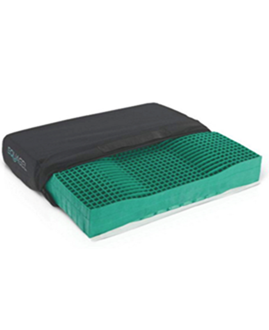
You may have noticed a number of new EquaGel cushions being distributed to our wards, courtesy of the Directorate of Nursing and Midwifery.
EquaGel cushions are excellent in preventing pressure injuries for our patients assessed at moderate risk of a pressure injury. They are made from a dry-polymer gel arranged in a series of columns. As pressure is placed on the cell wall, it gently collapses, allowing the users body weight to be distributed across a greater surface.
As well as the postural support, the open structure of the EquaGel cushion makes it significantly cooler than many other support cushions.
All EquaGel cushions come with breathable, water-resistant and multi-stretch covers.
They do not require inflation, and can be quickly and easily cleaned.
EquaGel cushions do not replace the need to hire ROHO cushions for our patients at high risk of pressure injury.
Each cushion is valued at approximately $500 so please ensure they are well cared for.
Multi-language Falls Prevention Education
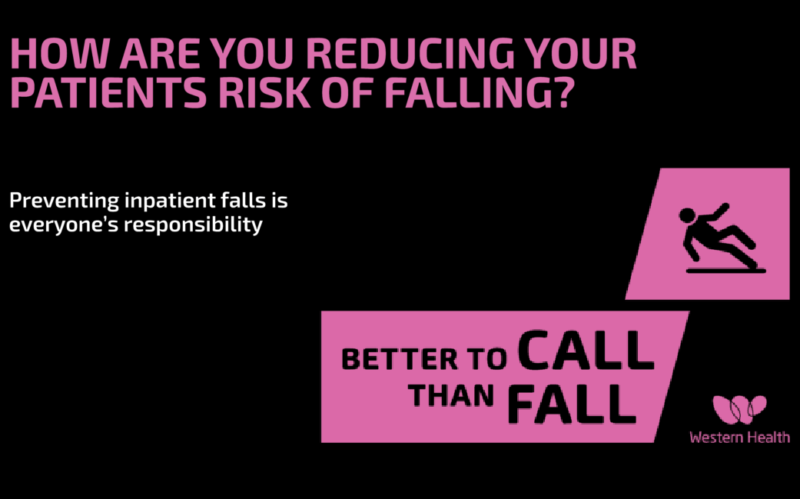
A series of patient falls prevention education brochures have been translated into our top 10 languages and are now accessible to print off from the Falls Prevention and Management Intranet page.
Please have a look and print some off to display in your areas. Topics include:
- Preventing a fall whilst in hospital
- Preventing falls – Footwear
- Preventing falls – Strength and Balance
- Preventing falls – Eyesight
- Preventing falls – Home modifications
The top 10 languages that these new brochures are in are:
- Arabic
- Chinese Simplified
- Chinese Traditional
- Croatian
- English
- Greek
- Italian
- Macedonian
- Serbian
- Vietnamese
From research we know that targeted patient education is the vest best thing you can do to prevent a person that is cognitively intact from falling. These brochures are evidence-based best practice, so spread the word and print off a bunch so they are ready to share when needed. Please start providing patients with a copy of the ‘How to Avoid a Fall in Hospital’ brochure on admission to any patient at risk of falling, along with any other brochure that is relevant.
Workforce Planning survey feedback
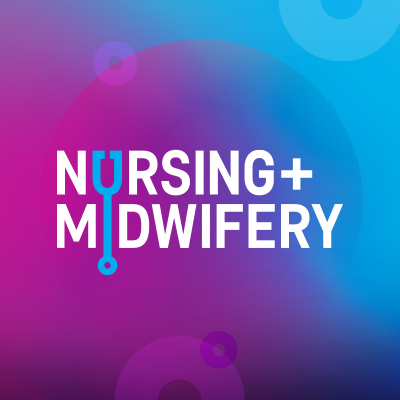
We recently sought your input into the development of the Nursing and Midwifery Workforce Plan for 2022-26 and received over 500 responses to the survey. Thank you to everyone who took the time to respond.
We were keen to explore your thoughts on the key actions that would attract and retain our staff, would empower best care and build expertise, and to enhance clinical and professional leadership over the next few years.
The key themes that emerged for attracting staff to Western Health were to improve the recruitment and onboarding experience and marketing strategies, along with expanding Graduate program options to specialty areas and offering transition to acute practice programs. For retaining staff, responses reflected that improving rostering practice to support wellness and worklife balance and supporting flexible work arrangements as the most important actions to implement. Night duty incentives, onsite services and safe access to public transport were the next actions identified as a priority for retaining our workforce.
The top actions to empower best care and build expertise were to enhance the alignment of educators and clinical support nurses to wards, to explore utilising support staff roles to assist Nurses and Midwives to work at full scope of practice and have flexibility of positions with pathways to move across areas. A clear framework for progression into specialty and advanced practice along with post graduate scholarships were also identified as key actions to facilitate this. The responses reflected the actions of increasing access to clinical leadership activities along with a framework and pathway for progression into management and leadership roles would enable enhancement of clinical and professional leadership. Other actions identified as a high priority are to improve access to leadership and management resources, offer rotating AUM positions and to increase formal leadership and management learning opportunities.
The survey respondees also commented on strategies or programs they felt should not continue or should be considered for the future. The ‘not to continue’ themes that emerged were related to practices that were seen as unfair and inconsistent which included rostering and staff allocation. Further strategies to be considered included expansion of education, career and leadership programs, education support on wards, flexible rostering practices, retention of experienced staff and workload protection. Other suggestions and comments noted included incentives such as pay increases, car parking, breaks, patient ratios, child care, vouchers / treats.
We appreciate the effort taken to respond to the survey and value your input. Formalising the priorities and timelines is in progress, with the finalised workforce plan document to be published shortly. You may have already seen that work on some of the suggested actions is already underway.
Premier announces RUSON funding whilst at Western Health
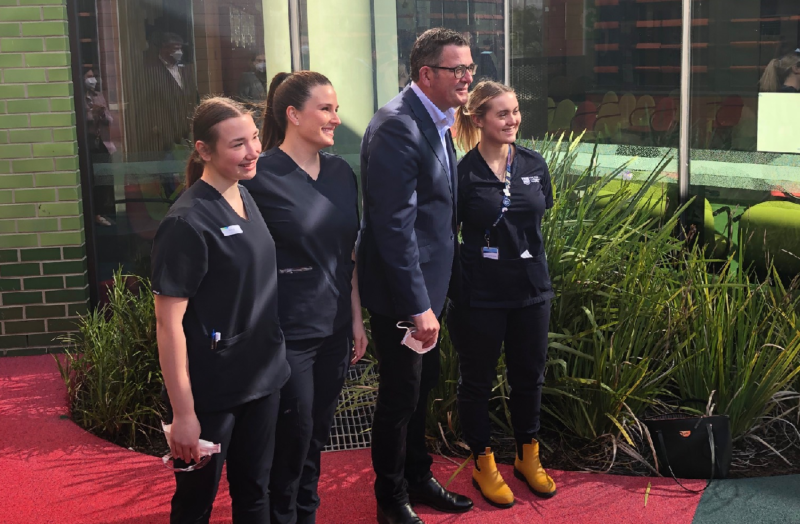
On Sunday 24 July Victorian Premier Daniel Andrews, together with Minister for Health Mary-Anne Thomas announced funding to support the employment of Registered Undergraduate Students of Nursing (RUSONs) whilst visiting Sunshine Hospital.
The 2022-23 State Budget announced a $59 million investment over two years to support health services employ RUSONs in the workforce. The RUSON role has been highly valued during the COVID-19 pandemic through improving the working environment for staff.
Western Health employs 361 RUSONs across most of our clinical wards/departments, as well as 56 RUSOMs in our maternity areas. The roles are on top of the mandated nurse and midwife to patient ratios, and this funding will support the continuing employment of RUSONs, which is fantastic!
Whilst Premier Andrews and Minister Thomas were at Western Health, they visited the Coronary Care team on Ward 2F, and spoke to one of our patients who was full of praise for our nurses.
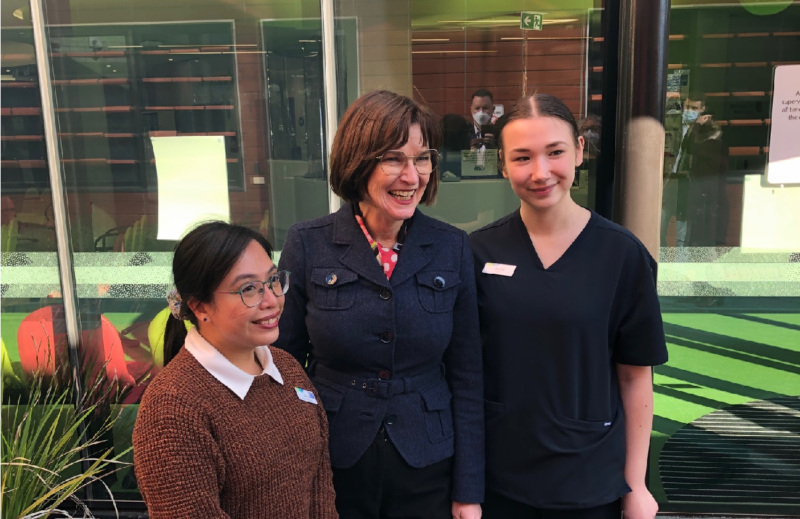
Jenny (NUM 2F) and Alana (RUSON, 2F) got to talk to the Premier (Alana pictured above with the Premier) and the Minister (Jenny and Alana pictured right with the Minister). Alana was joined by a RUSON from Royal Melbourne Hospital and a RUSOM from Werribee Mercy Hospital, and spoke at the press conference about how much she enjoyed the role and how it is really complementary to her studies as a second year undergraduate student nurse.
Western Health is expecting a separate announcement on funding to support RUSOM employment into the future.
New Footscray Hospital room prototypes ready for inspection

From 10 to 30 August 2022, Western Health’s new Footscray Hospital (NFH) project team, together with representatives from Plenary Health, will be taking staff through prototype rooms for the new facility.
The prototypes are built examples of rooms we will see in the NFH. The design of these rooms has been informed by feedback from staff who attended “mock-ups” last year. The purpose of the prototypes is for staff to further validate the spaces and clearances of the rooms, review the aesthetics and functionality of finishes, and assess the functionality of building services and equipment locations.
A limited number of prototype rooms are presented for inspection, including consulting rooms, inpatient bedrooms, Emergency Department bays and an operating room.
While attendance is encouraged, the NFH Project Team appreciates the significant operational pressure across the organisation will mean some staff are unable to attend prototype inspections. Prototypes are located at in a warehouse at 45 Bunnett St, Sunshine North. The warehouse is approximately a 10-minute drive from the current Footscray Hospital and 5 minutes from the Sunshine Hospital. The prototypes will be available for inspection through pre-booked appointments weekdays between 7.00am – 6.00pm.
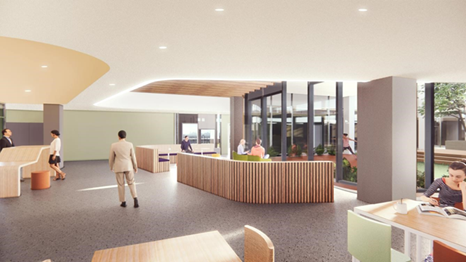
For staff convenience a mini bus will run to and from Footscray Hospital departing from the Outpatient’s entrance driveway in Eleanor Street – the bus departure time will be clearly indicated in your calendar invitation. For those wishing to drive there is free parking available onsite.
For nursing staff, a daily time slot is available between double staffing hours of 2.00pm -3.30pm. A 7.00am time slot is available for night shift staff. Please email nfh@wh.org.au with your preferred date and an invitation will be forwarded to you.
The NFH Project Team are committed to minimising the COVID related risks of prototype inspections. The prototypes have been constructed in an open warehouse space with natural ventilation and ample space for social distancing. The following requirements apply:
- Attendees must not attend the prototypes if they are feeling unwell or have COVID-19 symptoms
- All attendees will be required check-in to the prototype inspections and complete a temperature test and the Multiplex daily declaration
- Hand sanitiser will be provided throughout the prototypes warehouse
- Face masks will be mandatory
- The prototypes will be cleaned/sanitised regularly
New Delirium online learning module
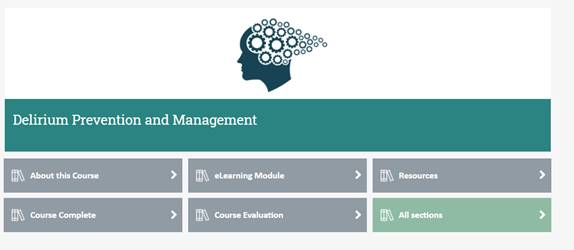
Our new Delirium Prevention and Management WeLearn module is now available for all clinical staff to complete. This course is recommended for all nursing, medial and allied health clinicians working with patients 18 years and over.
It will take staff approximately 45 minutes to complete and is both interactive and educational. This is the second module in the Comprehensive Care WeLearn Program.
Delirium is a risk factor for higher mortality and morbidity, prolonged length of stay and functional decline. It is a syndrome that is distressing for the patient, family, and staff. Delirium may be the only sign of a deteriorating patient. This Delirium Prevention and Management WeLearn module is designed to improve clinician knowledge and skill in delirium prevention, assessment, identification and management.
To undertake this module please go to WeLearn and search for delirium.
Duty of Candor commencing in November
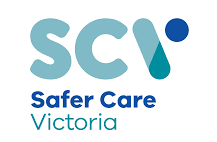
Amendments to the Health Services Act 1988 (Vic)(Act) introduces new legal obligations that will require relevant Victorian health services to apologise to patients and their families or carers when a patient has suffered a serious adverse patient safety event.
The reforms also introduce protections for apologies under the duty, and new protections for adverse event reviews.
Statutory Duty of Candour means that from 30 November 2022, health services will be required to:
- apologise to any person seriously harmed while receiving care
- explain what went wrong
- describe what action will be taken and improvements put in place.
To support the implementation Safer Care Victoria are running a webinars for healthcare workers to help clinicians prepare for implementation. Register for the public metropolitan health services session which will be held on Thursday 25 August, 12:00-1:00 pm.
Reusable Barrier Gowns providing sustainable safety
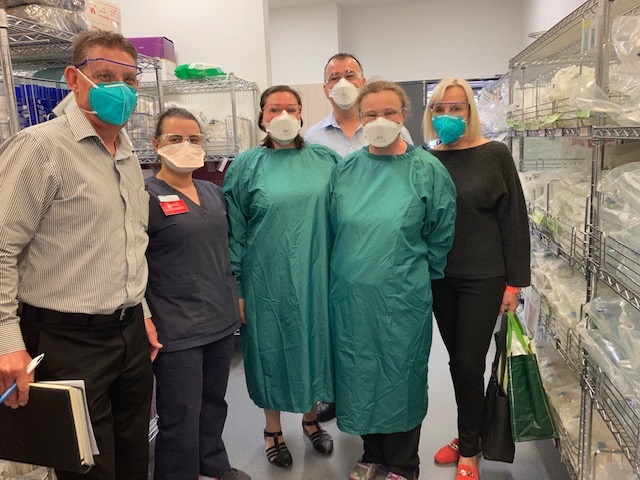
After a successful trial in both of the ICU’s, all areas of Western Health will now be able to access reusable barrier gowns. These gowns are a direct substitute for the single-use/disposable gowns that you will be familiar with. Of particular note is:
- The reusable gown is less expensive to launder than the cost of a disposable gown – this initiative reduces spending!
- The use of these gowns diverts large amounts of waste – the initiative reduces our environmental impact!
- These gowns have been approved for use by the Infection Prevention Team and specifically endorsed by Dr Marion Kainer as a suitable alternative to the yellow disposable gowns – this initiative is safe!
- These gowns are now the default gown for use in both ICU’s – this initiative has been embraced by staff!
The gowns have received overwhelmingly positive feedback, particularly in relation to how comfortable they are.
The use of these gowns does not require changes to donning and doffing procedures. Changing over an area is a simple and straightforward process with targeted support available to transition away from disposable.
This is a great sustainability initiative and provides the opportunity for Western Health and our staff to contribute to improved sustainability outcomes.
COVID Vaccination closure - end of an era
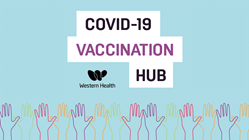
Most of Western Health’s vaccination sites closed over June 2022, and those that work at Sunshine will have noticed the return of the car park during July. It is an opportunity to reflect back on the achievements of the program.
In the 2021/22 financial year, the West Metro COVID-19 Vaccination Program led by Western Health administered 1,134,736 doses across the catchment. At its peak, the program employed 250 FTE staff including nurses, pharmacists, medical and support staff. The activity levels at the three busiest Western Health sites (Sunshine Hospital, Melbourne Exhibition and Convention Centre and Melbourne Showgrounds) were among the six most busy in the state. Western Health was at the forefront of innovation, opening Australia’s first drive-thru vaccination clinic in Melton.
The outreach service worked with local councils and community groups to provide ease of access vaccination opportunities for older members of the community, school children and their families and other high priority groups (including the Aboriginal community and homeless) in locations generally accessed by these groups (such as in-home, shopping centres, schools, festivals, community centres, local pools and parks). Since August 2021, the program has delivered over 570 ‘pop-up’ vaccination clinics across the community bringing vaccination directly to people who hadn’t yet prioritised it. As a result of an initiative advertising COVID and flu vaccinations through Meals on Wheels and a Letter Box Drop, 162 in-home appointments for COVID and Flu vaccinations have been provided to the elderly since April 2022.
The service implemented a custom purpose vaccination van with provisions for one cubicle inside the van and an external awning for an observation area. It is designed to provide a mobile pop up service to enable a convenient and accessible vaccination service to the community and broader public.
Another innovation led by the Western Health VicSIS Service was the establishment of the first adult sedation service through collaboration with Disability Liaison Officers and the Day Procedure Unit at Sunshine Hospital and a Paediatric Distraction +/- Sedation clinic which successfully vaccinates children and adults purely through distraction techniques. The service has received highly positive feedback from clients and families who have severe needle phobias and has now delivered significant numbers of successful vaccination episodes through this specialised service.
Western Health has received funding from the Department of Health to stand up two small fixed COVID vaccination sites in Wyndham and Brimbank and a mobile vaccination team, for the first quarter of the 2022-23 financial year. The focus of the state-led vaccination sites will be on vulnerable communities and populations.
We will continue to provide the fourth dose of the COVID vaccine to Western Health staff.
Nursing & Midwifery Research Grants and Research Week
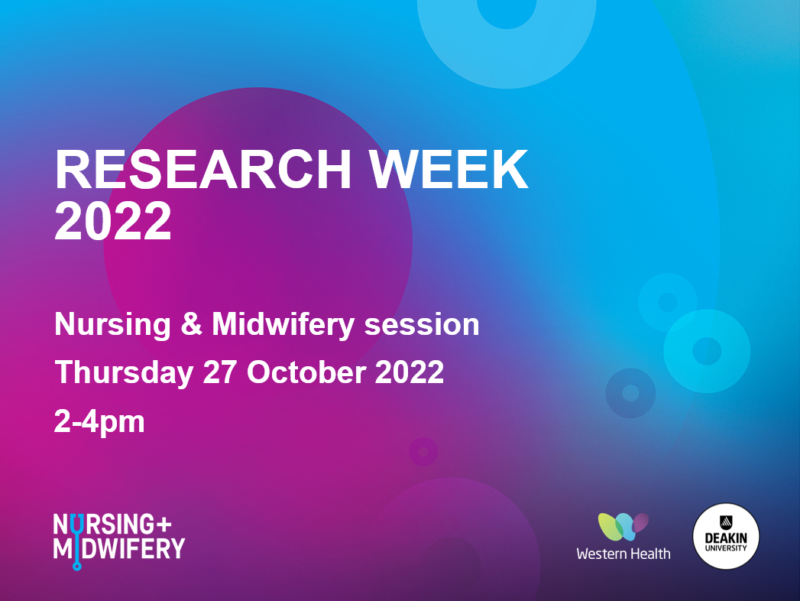
Western Health is committed to providing Best Care to our community. Underpinning Western Health’s world-class clinical care is our commitment to research and education.
Research Week is held each October at Western Health, to celebrate the great research undertaken at the health service and to learn more about our future initiatives and innovations.
As part of this important week Nursing & Midwifery holds a session which focuses on celebrating the work and projects undertaken by nurse and midwife researchers. During this week we also bestow Research Grants and the Mavis Mitchell Scholarship to support nursing and midwifery led research at Western Health.
In 2022 this session is being held on Thursday 27 October between 2-4pm.
Presenting during Research Week:
The Executive Director of Nursing and Midwifery is seeking applications from Western Health nursing and midwifery staff to present research and/or clinical audits that foster Best Care at Western Health. This year we have two types of presentations available, oral or poster presentations.
As an incentive, this year we are delighted to announce there will be a $250 prize for the best oral presentation and $250 for the best poster presentation.
Nursing & Midwifery Research Grants:
The Executive Director of Nursing and Midwifery is also seeking applications from Western Health nursing and midwifery staff for grant funding to undertake dedicated nursing and/or midwifery research. There are two Nursing & Midwifery Research Grants to be awarded this year:
- one for nursing related projects – $15,000
- one for midwifery related projects – $15,000.
There is also one Denise Paterson Research Grant of $10,000 open to a nurse or midwife. These are exciting opportunities for nurses and midwifes to be innovative, lead research and contribute to an improvement in practice and better patient outcomes.
For more information on how to apply please go to the Research Week page.
2022 Mavis Mitchell Memorial Scholarship
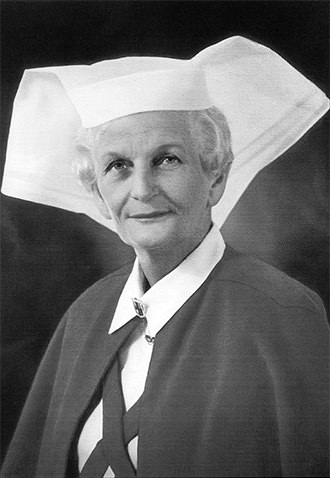
The Mavis Mitchell Memorial Scholarship honours the memory of Mavis J Mitchell who was the first Matron of Western Hospital. The intent of this fund, which commenced in 1990, is to support early researchers and service improvement by nurses or midwives across Western Health.
The scholarship provides funding to enable and assist eligible Registered Nurses/Midwives to undertake a service improvement/quality project or research in any activity approved by the Selection Committee.
If you are currently undertaking a research project or service improvement to benefit our patients/women or the community, or have a great idea and need some funding support, then consider applying for the $5,000 Mavis Mitchell Memorial Scholarship Grant which can provide financial assistance to help further your endeavours.
This project or research can be by an individual or group.
Applications close on 30th September 2022.
Guidelines and further information is available and can be found here and on the Nursing & Midwifery microsite.
Inspire Award nominations open
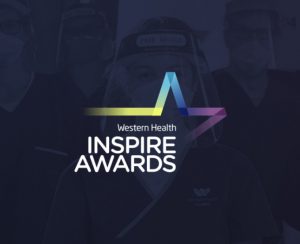
Is there someone or a team at Western Health who has inspired you?
The INSPIRE Awards recognise and celebrate those employees and volunteers who foster a positive workplace at Western Health and whose actions inspire others to live our values. They enable us to recognise and promote some of the great work being done by employees and volunteers at Western Health.
Anyone can nominate:
You can nominate online via the Inspire Award Internet site or you can complete a word version of the form which is available on the intranet and email it to inspire@wh.org.au
Completing your nomination:
Please ensure that you take the time to explain what the individual or team that you are nominating did which has made a difference to your experience or the experience of others.
Provide examples in as much detail as you can of how they fostered a Positive Workplace at Western Health and demonstrated Compassion, Accountability, Respect, Excellence and Safety in their work.
(A minimum of 3 of the values must be addressed in your nomination).
Please note that we may share what you say in your nomination as part of the Award Presentation process.
Nominations close August 12th 2022.
If you have any questions regarding Inspire Awards please email: inspire@wh.org.au
Vaccination Sedation Clinic finalist at the Victorian Disability Awards
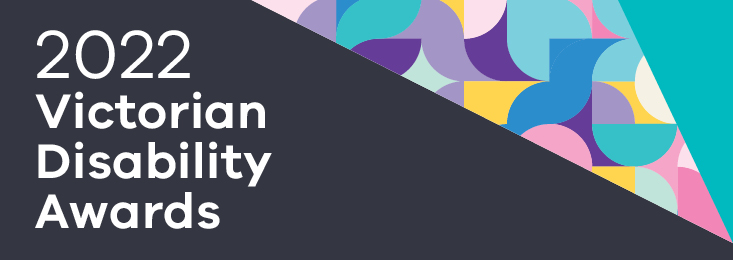
The Victorian Disability Awards have a strong focus on recognising and honouring the achievements and contributions of individuals, teams and organisations that promote the rights and inclusion of people with disability.
Western Health’s Vaccination Sedation Clinic has been shortlisted as a finalist for the 2022 Victorian Disability Awards, in the Excellence in Promoting Health, Housing and Wellbeing category.
Our Vaccination Sedation Clinic was a huge team effort, with experts involved from the Disability Liaison team, Day Procedure Unit, anaesthetics and the COVID Vaccination Hub team. This service was amazing during our huge push to get Victorian vaccinated, providing a tailored service to people with a disability to support them to get the COVID vaccine. The skills of the team involved often meant that the consumers were able to be vaccinated without sedation – however sedation was there as an option if it was needed. Without this services of the community’s most vulnerable people would not have been protected against COVID-19.
The awards will be announced at a ceremony on Wednesday 24 August 2022. Good luck to this sensational team!
Only weeks until the Flu Vax deadline
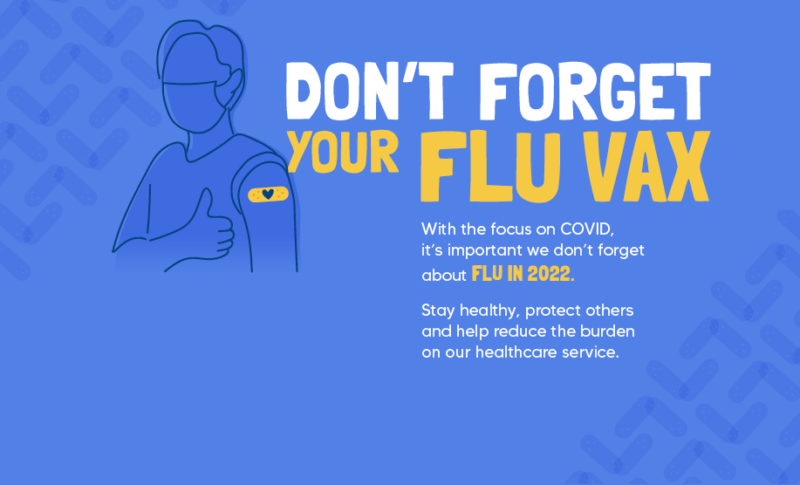
It is only a couple of weeks until the 2022 mandatory influenza vaccination deadline for Category A and Category B healthcare workers. The Department of Health has made 15 August the annual deadline each year from 2022, and this will be on ongoing requirement.
Category A healthcare workers are those that have direct physical contact with patients, clients, deceased persons or body parts, blood, body substances, infectious material or surfaces or equipment that might contain these; or contact that might allow respiratory infections to be acquired or transmitted, for example workers with prolonged face-to-face contact with patients or clients or where their normal work is in a clinical area. Most Western Health nurses and midwives are in Category A.
Category B healthcare workers are those that work in patient areas who rarely have direct contact with blood or body substances. These employees may be exposed to infections spread by droplets, such as influenza.
All Western Health staff are eligible to get free Influenza Immuniation. Fixed and roaming immunisation clinics are occurring at all sites and the session times can be found on the Infection Prevention Calendar on the intranet webpage. If you’ve been vaccinated at another hospital, by your GP or elsewhere, please complete a quick Redcap survey, attach your immunisation certificate or alternatively, you can consent for us to check your AIR immunisation record.
If you have yet to be vaccinated, you are urged to act quickly.
Champions of EMR Phase 2.1 Change
Since launching in March, the EMR Phase 2.1 Change Champion Network has seen over 265 staff join to learn more about the upcoming enhancements to our clinical systems.
Nursing and Midwifery staff make up a large percentage of the Change Champion Network, and we spoke to a few of them to find out why they are excited about the introduction of EMR Phase 2.1 into their areas.
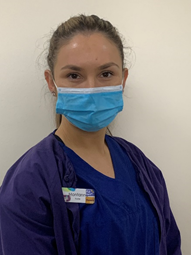
Montanna McQuade – Williamstown Perioperative
What will the expansion of the EMR into your area mean for you and your colleagues?
What we’re all looking forward to is the fact that everything is going to be on the one system. Currently when a patient comes in, we have multiple desktop files open so to have that all combined together will mean our jobs will be a lot easier and also reduce risks. We’re really excited that we won’t have to double up on our paperwork
It’s great that we’ll be able to see the workflow from when a patient is admitted, so we can see the patient’s journey from there all the way to the ward, and it also makes the handover to the ward easier.
What are you most excited about?
I think the main thing that’s exciting is this will be integrated across all campuses, so that for patients it’s going to be better for their health, better for their journey from start to end in the hospital. For staff we’re all going to be on the same level and be able to access the same things, so patient safety and care and minimised risk is going to lead to better outcomes for our patients.
I’m really looking forward to it. I’ve worked at other places which have similar things, but personally the EMR at Western Health has been one of the best electronic systems I’ve used. It’s very clear, very easy to understand, and it’s going to be really good across all campuses and all different ages. I think it’s really exciting and it’s a very positive change for Western Health.
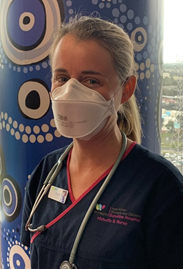
Elonie Prenter – Joan Kirner Women’s and Children’s
What will the expansion of the EMR into your area mean for you and your colleagues?
Things like keeping track of blood loss. Sometimes that can get a little lost in translation from someone’s handwritten notes, or from Birthing to Theatre, or even going between wards, so having one location to input that information will be more accurate and paint a clearer picture
Hopefully it will be easier to access relevant information on patient history, like alerts, or things that are going to mean we can find that information more easily so hopefully that can lead to more sensitive care.
What do you see as the benefits of the Change Champion Network?
I’m looking forward to being the person who can help other people use the system and feel really positive about the change. We’ve had to deal with a lot of change recently with Covid, and there’s been so much pressure on us to learn new things and keep evolving, but this is a change that is going to really help us to do our jobs more easily, so the more of us that know how to use it effectively the better it will be.
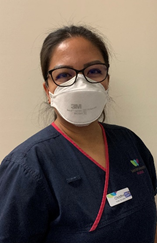
Christine Katsikis – Footscray Emergency Department
What will the expansion of the EMR into your area mean for you and your colleagues?
I think amalgamating all the programs is important. We have like 20 million programs that we have to access for one patient, so having the one program will create consistency in the process of being able to start the patient’s journey in our department until they finish their journey in our department.
Being able to access all the information at hand straight away will save us time as well and let us spend more time with the patient, and it shows the patient that we’re all on board across the multi-disciplinary teams
Why did you join the Change Champion Network?
I’ve been here for 17 years, and one of the things about change is it is hard. Some people find it harder than others, but the best thing to do when it is hard is to jump on board to get familiar with the change practice mindset.
To be part of the leadership team to implement these changes for the better is really exciting, and being part of the planning conversation around our provision of health is really important.
To find out more about EMR Phase 2.1 and the Change Champion Network, please visit digitalhealth.wh.org.au/emr-phase-2
Graduate Nurse research participants wanted
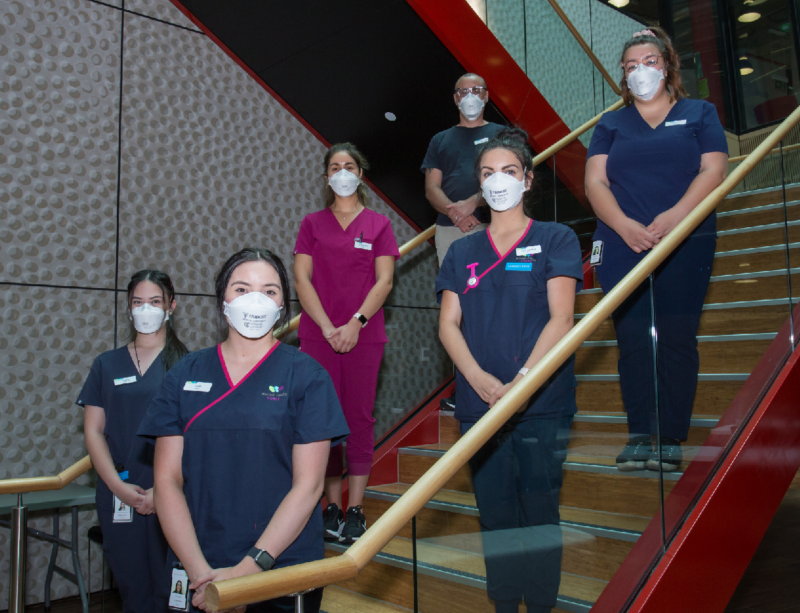
Libby Muir is studying at the University of Melbourne and is undertaking a research project titled Becoming a Nurse: A mixed methods study of student nurse employment and graduate nurse experience.
The purpose of the research is to further explore the influence of undergraduate employment on registered nurse preparation, work readiness and consequential transition to nursing practice, along with the potential impact on workforce recruitment and retention.
The effectiveness of undergraduate nursing preparation, nursing students’ access to clinical experience and the graduate nurse’s experience of transition to nursing has been the subject of professional discussions for many years. While it is known that undergraduate nurses work during their university study, there is limited research about the impact of their employment on their learning and preparation. The introduction of the Registered Undergraduate Student of Nursing (RUSON) employment model in Victoria, and it’s rapid expansion has provided an opportunity to explore the influence undergraduate employment may have on the graduate nurse’s experience of becoming a nurse.
Pilot evaluations have suggested that employing RUSONs may improve the clinical skills, confidence, time management, communication and work readiness of the student and assist graduate nurses transition to practice. These early studies also demonstrated the value of the RUSON position to the workforce, health service and patient care.
The purpose of this research is to explore the influence of undergraduate nursing student employment on new graduate preparation, work readiness and consequential transition to nursing practice.
The survey is estimated to take between 15 and 20 minutes and is available online here. Further information is also available through the Plain Language Statement.
We encourage our Graduate Nurses to participate in this study if able. At a time when recruitment and retention of graduate nurses is critical, this study may provide an expanded understanding of the graduate perspective.
To demonstrate appreciation for graduate nurses participating in the survey, the researcher has organised the opportunity for participants to register for the draw to win one of five $100 vouchers.
Bench-marking Best Care
The latest benchmark reports from the Health Roundtable that go up to March 2022 show how our delivery of Best Care compares to other health services across Australasia.
Let’s look at how we perform in the area of Severe Perineal Laceration, which includes third and fourth degree tear during vaginal delivery.
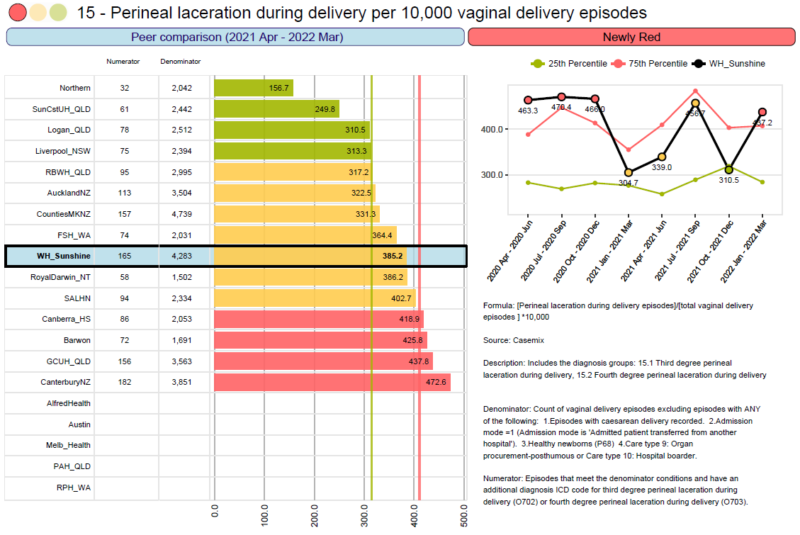
Severe Perineal Laceration:
Sunshine Hospital
The rates of severe perineal tears during vaginal delivery at Joan Kirner Women’s and Children’s previously was exceptionally high – in fact we were performing worse than our peers. However there has been concerted efforts through the Maternity CARES Improvement Plan, and the great news is that this has consistently been dropping over the past 12 months, making us now very comparable to our peers.
However the latest quarter we are up again in the red, so we will need to retain our focus on improving in this area.
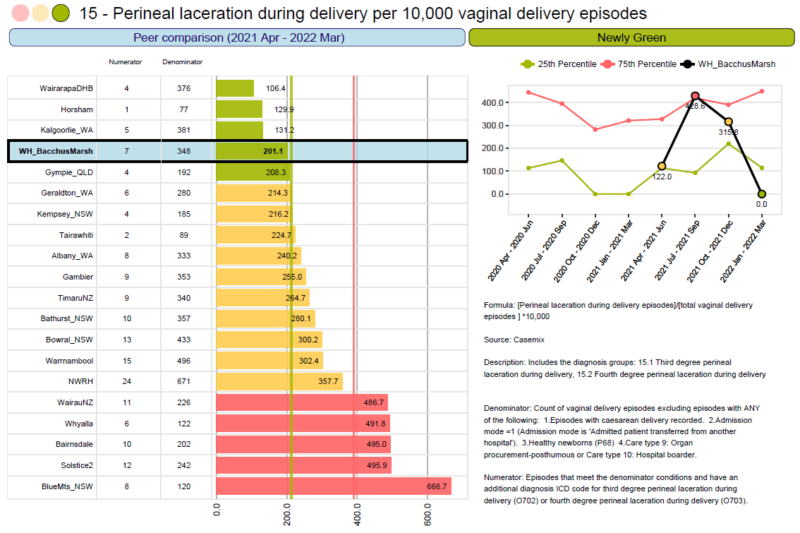
Bacchus Marsh Hospital:
There has been a significant drop in the rate of severe perineal tears at Bacchus Marsh Hospital since the introduction of the Western Health Birthing Guideline, with us dropping from red 6 months ago, to green this quarter. This is a significant improvement – well done to our Bacchus Marsh midwives!
Australian Clinical Entrepreneur Program launched
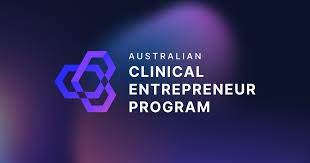
We are pleased to announce the launch of the Australian Clinical Entrepreneur Program of which Western Health is a partner organisation.
The Clinical Entrepreneur program is based on the highly successful UK NHS Clinical Entrepreneur Program. The Australian Clinical Entrepreneur Program (AUSCEP) aims to up skill clinicians and accelerate innovation by developing the entrepreneurial and innovation mindset of Australia’s healthcare professionals to create positive change for the Australian healthcare system. This initiative compliments the Western Health/University of Melbourne Innovation Acceleration Program that will also be launched in August.
Starting October 2022, the Australian Clinical Entrepreneur Program (AUSCEP) will equip you with the skills to transform your ideas into products and businesses that benefit the clinical care of patients — both in Australia and around the world.
The 12-month program includes 8 full-day in person sessions (in either Sydney, Melbourne or Perth) spread out over the year, with ongoing coaching, mentorship, industry engagement, and funding introductions. The first cohort of 50 clinicians will come from Victoria, NSW and WA.
Call for applications close on the 8 August 2022.
We encourage all clinical staff ( including nurses and midwives) to review the program details as per above link and submit an application as per the criteria for applying.
If anyone needs to discuss this further either Bill Karanatsios or A/Prof Harin Karunajeewa from the Office of Research would be happy to discuss your interest in the program further.
Oral Liquid Opioid Medications - Supply Changes
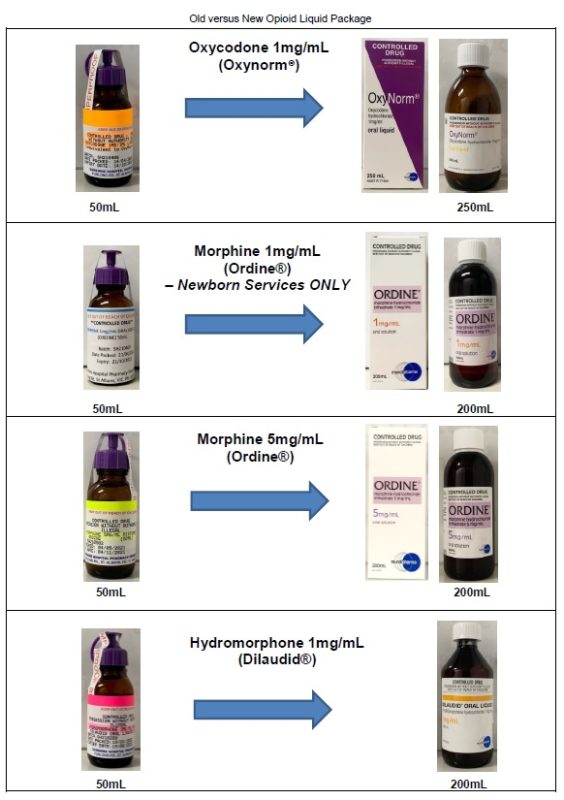
To improve medication safety and the management of opioid liquid discrepancies, Western Health Pharmacy will now issue all S8 oral liquids in their commercial packs as imprest stock instead of prepacked 50ml bottles.
Commercial bottles provide different product appearance which will improve medication safety by reducing risk of selection and administration errors. Smaller packs will only be issued by exception in consultation with the relevant stakeholders.
Please refer to the procedure Medication Prescription, Supply, Storage and Administration for guidance around discrepancy reporting:
- Section 8.4.3 Schedule 8 or Schedule 11 Medicine Discrepancy Incident Reports (page 6)
- Appendix 2: Medicine Discrepancy Investigation Flowchart.(page 33)
Refer to your pharmacist if you require further information.
Emerging Evidence
The Western Health Library Service is a great source for locating the latest nursing and midwifery related evidence based practice and research.
Articles of interest:
- Health service COVID-19 wellbeing and support initiatives: a mixed-methods evaluation. Occupational Medicine. 2022: July. Full Text Western Health Author
- Australian maternity care, considering risk and supporting safety: a scoping review. Midwifery, 2022: Sept. Full Text Western Health Author
- Translating evidence into practice: implementing culturally safe continuity of midwifery care for First Nations women in three maternity services in Victoria. eClinicalMedicine. 2022: May Full Text Western Health Author
- Australian and Danish nurses’ and midwives’ wellbeing during COVID-19: a comparison study. Collegian. 2022: June Full Text Western Health Author
- Understanding midwifery student needs and expectations of peer-mentoring for clinical placement: a qualitative questionnaire study. Collegian. 2022: June Article Link Request This Article Western Health Author
- Family-centred care interventions to reduce the delirium prevalence in critically ill patients: a systematic review and meta-analysis. Nursing Open 2022: July Full Text
- Association of hospital and community factors on the attainment of Baby-Friendly designation: a breastfeeding health promotion. Maternal & Child Nutrition. 2022: July Full Text
- Adult inpatients’ perceptions of their fall risk: a scoping review. Healthcare (Basel). 2022: May Full Text
New Nursing/Midwifery eBook Title:
- Reading, understanding, and applying nursing research. Philadelphia: F.A. Davis, 2021. 6th edition
This sixth edition of Reading, Understanding, and Applying Nursing Research has been updated while retaining all important features of previous editions. The book has been updated to better guide students in their understanding of evidence-based practice. The book continues to be directed toward undergraduate students, RNs returning to school, and practicing nurses. This edition continues to emphasize how to read research reports, evaluate them critically, and apply findings to practice by providing more examples of nursing research throughout the book. Steps of the research process are illustrated with excerpts from studies that have been published in nursing literature.
Lowitja Institute Aboriginal and Torres Strait Islander Search Tool: Lit Search
This open access search tool provides easy access to Aboriginal and Torres Strait Islander health literature on the PubMed database. You can do a keyword search to look at all literature or choose one of 27 search topics. You can also refine your search by entering keywords, filter options and published dates. Install LibKey Nomad browser extension to view instant full-text library article links in your PubMed Lit Search results page. Why not Take the WH Library with you wherever you browse.
View the library collection of Indigenous Health Print and eBook Titles.
Off-site or home access to the library eBook titles and databases, require free library membership. If you are not a member you can Join Online. For more information Click on our FAQ page.
Visit the library’s Intranet website, or ring the library to speak with a Librarian: 8395 8036 or 8345 6655. Working from home? Visit the Library Internet site.

